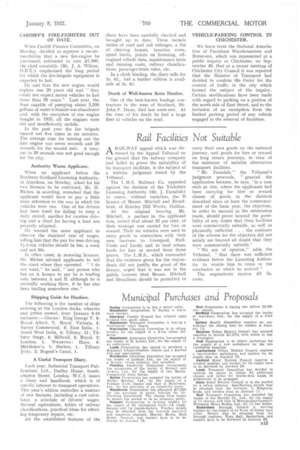Rail Facilities Not Suitable
Page 27

If you've noticed an error in this article please click here to report it so we can fix it.
ARAILWAY appeal which was dismissed by the Appeal Tribunal on the ground that the railway company had failed to prove the suitability of its transport facilities, is the subject of a written judgment issued by the Tribunal.
The L.M.S, Railway Co. appealed against the decision of the Yorkshire Licensing Authority (Mr. J. Farndale) to renew, without variation, the B licence of Messrs. Mitchell and Broad-. bent, of Brierley Hill Works, Halifax.
At the original hearing, Mr. Mitchell, a partner in the applicant firm, stated that about 25 per cent, of their tonnage was carried for hire or reward. Their six vehicles were used to carry goods in connection with their own business to Liverpool, Hull, Goole and Leeds, and to haul return loads for hire or reward from those places. The L.M.S., which contended that the evidence given for the respondents did not justify the grant of the licence, urged that it was not in the public interest Oat Messrs. Mitchell 'and Broadbent should be permitted to
carry their own goods on the outward journey, and goods for hire or reward on long return journeys, in view of the existence of suitable alternative transport facilities.
" Mr. Farndale," the Tribunal's judgment proceeds, granted the application because, he says, 'in. a case such as this, where the applicants had been carrying for hire or reward classes of goods in the districts described since at least the commencement of the basic year, the objectors, in order to succeed in the submission made, should prove beyond the possibility of any .doubt that their facilities were commercially suitable, as well a-9 physically sufficient . . . the evidence of the witness for the objectors did not satisfy me beyond all doubt that they were commercially suitable.'
"We, are, of opinion," adds the Tribunal, " that there was sufficient evidence before the Licensing Authority to enable him to come to the conclusion at which he arrived."
The respondents receive £5 Ss. costs.




























































































